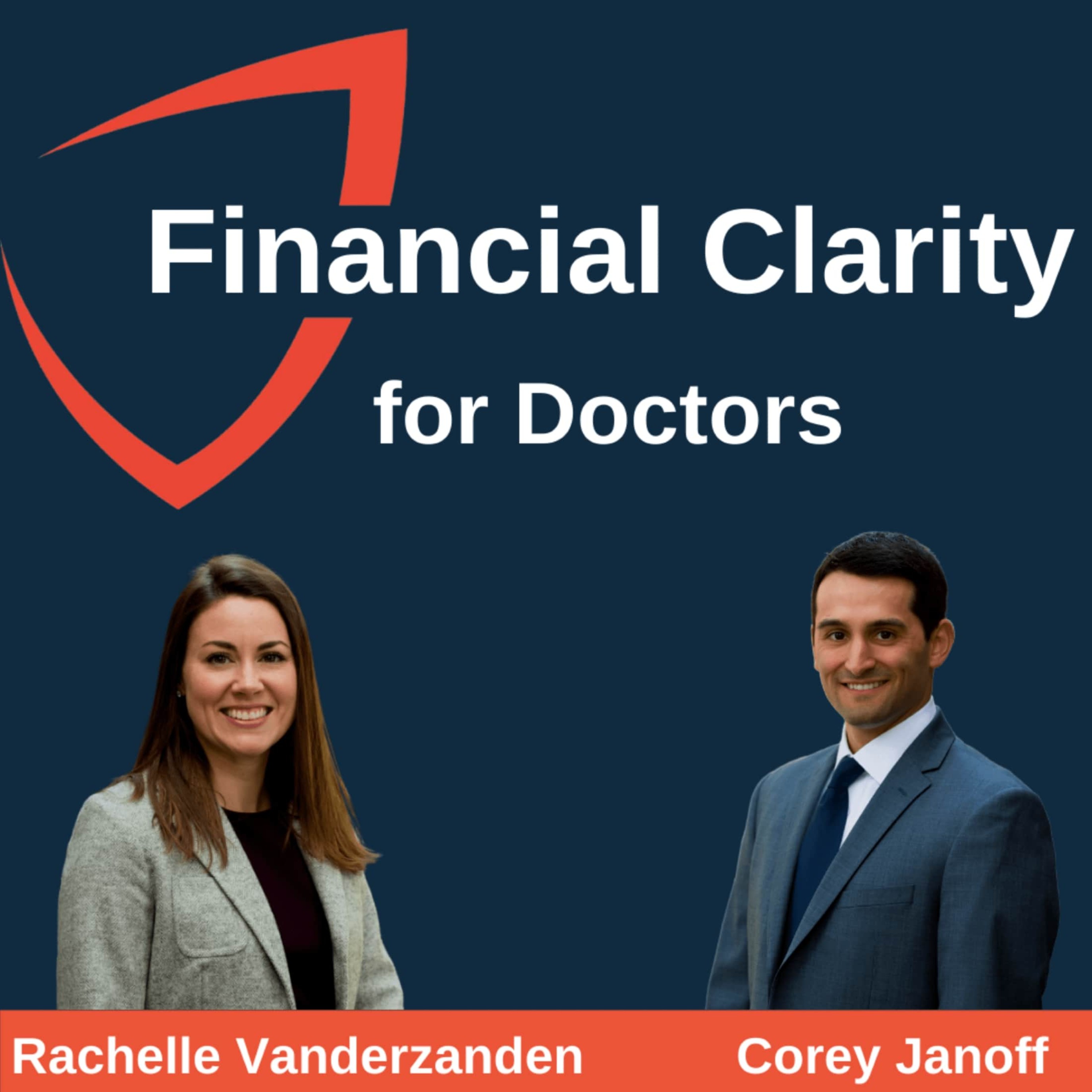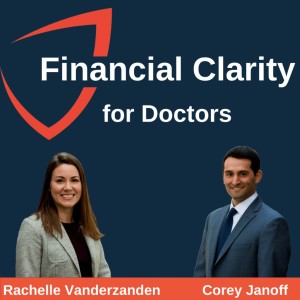
Corey Janoff and Rachelle Vanderzanden of Finity Group discuss pertinent financial planning topics affecting doctors and other medical professionals.
Corey Janoff and Rachelle Vanderzanden of Finity Group discuss pertinent financial planning topics affecting doctors and other medical professionals.
Episodes

Monday Dec 20, 2021
Stealth Wealth
Monday Dec 20, 2021
Monday Dec 20, 2021
Welcome back and thank you for listening to another episode of Financial Clarity for Doctors!
Today we want talk about the concept of stealth wealth, i.e., flying under the wealth radar so people don’t realize how wealth you actually are.
In this episode Corey & Rachelle discuss:
- Stories of Stealth Wealth
- Keeping Up With The Joneses
- The Benefits of Stealth Wealth
- Financial Independence
For more financial planning tips from Corey and Rachelle, find them on social media!
LinkedIn: @CoreyJanoff and @RachelleVanderzanden; Instagram: @CoreyJanoff and @VanderzandenRachelle; and Twitter: @CoreyJanoffCFP and @RachelleFinance
Follow Finity Group On Social Media!
APPLE PODCASTS
Discussions in this show should not be construed as specific recommendations, legal, or investment advice. Always consult with your investment professional before making important investment decisions—advisory services through Cambridge Investment Research Advisors, Inc., a Registered Investment Advisor. Through Cambridge Investment Research, Inc., Securities are offered a registered Broker/Dealer, Member FINRA/SIPC. Finity Group and Cambridge are not affiliated.

Monday Dec 06, 2021
When Headlines Drive Decisions
Monday Dec 06, 2021
Monday Dec 06, 2021
Welcome back and thank you for listening to another episode of Financial Clarity for Doctors!
Expect to see a lot of headlines as we close out the year, particularly on the tax side of things with the upcoming changes to the tax code
In this episode Corey & Rachelle discuss:
- Social Security Headlines
- Is Social Security Going Bankrupt?
- Upcoming Tax Law Changes
For more financial planning tips from Corey and Rachelle, find them on social media!
LinkedIn: @CoreyJanoff and @RachelleVanderzanden; Instagram: @CoreyJanoff and @VanderzandenRachelle; and Twitter: @CoreyJanoffCFP and @RachelleFinance
Follow Finity Group On Social Media!
APPLE PODCASTS
Discussions in this show should not be construed as specific recommendations, legal, or investment advice. Always consult with your investment professional before making important investment decisions—advisory services through Cambridge Investment Research Advisors, Inc., a Registered Investment Advisor. Through Cambridge Investment Research, Inc., Securities are offered a registered Broker/Dealer, Member FINRA/SIPC. Finity Group and Cambridge are not affiliated.

Monday Nov 22, 2021
Target Date Funds - Good Or Bad?
Monday Nov 22, 2021
Monday Nov 22, 2021
Welcome back to another episode of Financial Clarity for Doctors!
Have you ever wondered what happens to your money when it goes into your plan at work if you do NOTHING? Today we are going to talk about a type of mutual fund commonly referred to as a Target Date Fund or a Lifestyle fund. They are almost always in your work plans, but you can use them in other accounts as well.
In this episode Corey & Rachelle discuss:
- What is a Target Date Fund?
- The Pros to Target Date Funds
- The Cons to Target Date Funds
For more financial planning tips from Corey and Rachelle, find them on social media!
LinkedIn: @CoreyJanoff and @RachelleVanderzanden; Instagram: @CoreyJanoff and @VanderzandenRachelle; and Twitter: @CoreyJanoffCFP and @RachelleFinance
Follow Finity Group On Social Media!
APPLE PODCASTS
Discussions in this show should not be construed as specific recommendations, legal, or investment advice. Always consult with your investment professional before making important investment decisions—advisory services through Cambridge Investment Research Advisors, Inc., a Registered Investment Advisor. Through Cambridge Investment Research, Inc., Securities are offered a registered Broker/Dealer, Member FINRA/SIPC. Finity Group and Cambridge are not affiliated.

Monday Nov 08, 2021
Monday Nov 08, 2021
Welcome back to another episode of Financial Clarity for Doctors!
Disability insurance is a hot topic for young doctors. The most common question we get – Do I need my own policy? There is a ton of heavy-handed advertising which can make it seem like it’s just a sales ploy, when in reality it is a VERY important part of financial planning.
In this episode Corey & Rachelle discuss:
- Why You Need Individual Disability Insurance
- The Pitfalls of Group Coverage
- Disability Insurance Cost Overview
For more financial planning tips from Corey and Rachelle, find them on social media!
LinkedIn: @CoreyJanoff and @RachelleVanderzanden; Instagram: @CoreyJanoff and @VanderzandenRachelle; and Twitter: @CoreyJanoffCFP and @RachelleFinance
Follow Finity Group On Social Media!
APPLE PODCASTS
Discussions in this show should not be construed as specific recommendations, legal, or investment advice. Always consult with your investment professional before making important investment decisions—advisory services through Cambridge Investment Research Advisors, Inc., a Registered Investment Advisor. Through Cambridge Investment Research, Inc., Securities are offered a registered Broker/Dealer, Member FINRA/SIPC. Finity Group and Cambridge are not affiliated.

Monday Oct 25, 2021
Reality Minus Expectations = Satisfaction
Monday Oct 25, 2021
Monday Oct 25, 2021
Welcome to another episode of Financial Clarity for Doctors!
Today we want to discuss your happiness and satisfaction and how it is largely tied to your expectations.
As a little kid, if you got the present you asked for, you were elated. If you didn’t, you were disappointed. The best way to avoid disappointment is properly managing your expectations.
In this episode we will talk about:
- Does Your Income Rise Faster Than Your Expectations
- Lifestyle Expectations
- Focusing on What You Can Control & What Matters
For more financial planning tips from Corey and Rachelle, find them on social media!
LinkedIn: @CoreyJanoff and @RachelleVanderzanden; Instagram: @CoreyJanoff and @VanderzandenRachelle; and Twitter: @CoreyJanoffCFP and @RachelleFinance
Follow Finity Group On Social Media!
APPLE PODCASTS
Discussions in this show should not be construed as specific recommendations, legal, or investment advice. Always consult with your investment professional before making important investment decisions—advisory services through Cambridge Investment Research Advisors, Inc., a Registered Investment Advisor. Through Cambridge Investment Research, Inc., Securities are offered a registered Broker/Dealer, Member FINRA/SIPC. Finity Group and Cambridge are not affiliated.

Monday Oct 11, 2021
Spending More Than You Make
Monday Oct 11, 2021
Monday Oct 11, 2021
Welcome to another episode of Financial Clarity for Doctors!
We spend a lot of time talking about how to make sure you are in a good position to reach your long-term goals. For most of our clients and listeners, you are in a good position with your career and income trajectory to be able to do that! You’ve worked hard and you will very likely make a good income!
However, we do talk to a lot of folks, especially folks that are still on a resident or fellow salary, that are not in a good spot to work toward those long-term goals. Sometimes, they aren’t even in a good spot to be able to make ends meet from month to month.
Today, we are going to focus on a few strategies to make the day-to-day more doable.
In this episode we will dive deeper into:
- Managing Expenses
- Debt Management
- Spend Less or Make More
- Your Long Term Outlook
For more financial planning tips from Corey and Rachelle, find them on social media!
LinkedIn: @CoreyJanoff and @RachelleVanderzanden; Instagram: @CoreyJanoff and @VanderzandenRachelle; and Twitter: @CoreyJanoffCFP and @RachelleFinance
Follow Finity Group On Social Media!
APPLE PODCASTS
Discussions in this show should not be construed as specific recommendations, legal, or investment advice. Always consult with your investment professional before making important investment decisions—advisory services through Cambridge Investment Research Advisors, Inc., a Registered Investment Advisor. Through Cambridge Investment Research, Inc., Securities are offered a registered Broker/Dealer, Member FINRA/SIPC. Finity Group and Cambridge are not affiliated.

Monday Sep 27, 2021
Your Savings Rate Matters A Lot
Monday Sep 27, 2021
Monday Sep 27, 2021
Welcome to another episode of Financial Clarity for Doctors! In todays episode we will discuss arguably the most important factor in achieving your long-term financial goals: how much you save.
The more you save, the sooner you’ll get to where you want to go financially. Basic math. It will also give you more flexibility and cushion.
In this episode we will dive deeper into:
- Client Success Stories
- Living Below Your Means
- Retirement: How Long To Achieve Financial Independence
- Why Savings Rate Can Be More Important Than Rate Of Return & Other Metrics
For more financial planning tips from Corey and Rachelle, find them on social media!
LinkedIn: @CoreyJanoff and @RachelleVanderzanden; Instagram: @CoreyJanoff and @VanderzandenRachelle; and Twitter: @CoreyJanoffCFP and @RachelleFinance
Follow Finity Group On Social Media!
APPLE PODCASTS
Discussions in this show should not be construed as specific recommendations, legal, or investment advice. Always consult with your investment professional before making important investment decisions—advisory services through Cambridge Investment Research Advisors, Inc., a Registered Investment Advisor. Through Cambridge Investment Research, Inc., Securities are offered a registered Broker/Dealer, Member FINRA/SIPC. Finity Group and Cambridge are not affiliated.

Monday Sep 13, 2021
Budgeting Tips
Monday Sep 13, 2021
Monday Sep 13, 2021
Welcome to another episode of Financial Clarity for Doctors. In todays episode we will discuss a topic regarding one of the most common requests we get... Budgeting!
Many people only consider their ability to meet their fixed expenses and that is what we want to avoid. In this episode we will dive deeper into the following:
- Traditional Budgeting
- Backwards Budget
- The Importance of AWARENESS
- Housing
For more financial planning tips from Corey and Rachelle, find them on social media!
LinkedIn: @CoreyJanoff and @RachelleVanderzanden; Instagram: @CoreyJanoff and @VanderzandenRachelle; and Twitter: @CoreyJanoffCFP and @RachelleFinance
Follow Finity Group On Social Media!
APPLE PODCASTS
Discussions in this show should not be construed as specific recommendations, legal, or investment advice. Always consult with your investment professional before making important investment decisions—advisory services through Cambridge Investment Research Advisors, Inc., a Registered Investment Advisor. Through Cambridge Investment Research, Inc., Securities are offered a registered Broker/Dealer, Member FINRA/SIPC. Finity Group and Cambridge are not affiliated.

Monday Aug 30, 2021
Why Are You Invested The Way You Are
Monday Aug 30, 2021
Monday Aug 30, 2021
Welcome to another episode of Financial Clarity for Doctors. In today's episode we want to talk about investing. Specifically, investing towards your specific financial goals.
What would most people say if you asked them, "Why are you invested the way you are?"
We also discuss:
- Risk Return Objectives
- Time Horizons
- Liquidity Needs
- Income VS Growth
- ESG Investing
For more financial planning tips from Corey and Rachelle, find them on social media!
LinkedIn: @CoreyJanoff and @RachelleVanderzanden; Instagram: @CoreyJanoff and @VanderzandenRachelle; and Twitter: @CoreyJanoffCFP and @RachelleFinance
Follow Finity Group On Social Media!
APPLE PODCASTS
Discussions in this show should not be construed as specific recommendations, legal, or investment advice. Always consult with your investment professional before making important investment decisions—advisory services through Cambridge Investment Research Advisors, Inc., a Registered Investment Advisor. Through Cambridge Investment Research, Inc., Securities are offered a registered Broker/Dealer, Member FINRA/SIPC. Finity Group and Cambridge are not affiliated.

Monday Aug 16, 2021
Financial Plan VS Financial Planning
Monday Aug 16, 2021
Monday Aug 16, 2021
In today's episode we talk about the difference between having a financial plan and engaging in financial planning.
In this episode we discuss:
- Initial steps in building a financial plan
- Understanding the different variables that can change over time
- What does engaging in financial planning look like?
- Being proactive instead of reactive
Thank you so much for listening to this episode of Financial Clarity for Doctors podcast! A financial planning podcast for physicians and other medical professionals.
For more financial planning tips from Corey and Rachelle, find them on social media!
LinkedIn: @CoreyJanoff and @RachelleVanderzanden; Instagram: @CoreyJanoff and @VanderzandenRachelle; and Twitter: @CoreyJanoffCFP and @RachelleFinance
Follow Finity Group On Social Media!
APPLE PODCASTS
Discussions in this show should not be construed as specific recommendations, legal, or investment advice. Always consult with your investment professional before making important investment decisions—advisory services through Cambridge Investment Research Advisors, Inc., a Registered Investment Advisor. Through Cambridge Investment Research, Inc., Securities are offered a registered Broker/Dealer, Member FINRA/SIPC. Finity Group and Cambridge are not affiliated.
